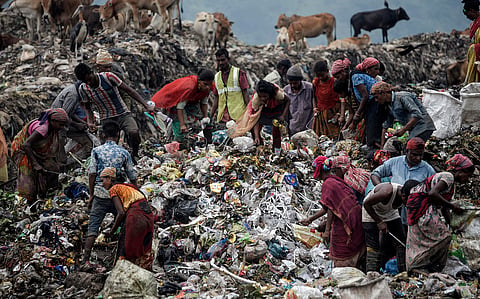World needs global treaty with holistic approach to plastic lifecycle management
The world will soon gather in the South Korean city of Busan for the fifth session of the Intergovernmental Negotiating Committee (INC-5) on plastic pollution from November 25-December 1, 2024. The aim is clear—to finalise a transformative Global Plastics Treaty that addresses every phase of plastics—from production through disposal, impacting environment and human lives at every stage of its lifecycle.
Plastic pollution cannot be solved simply by reducing waste. Plastic harms us from the moment it’s made to when it’s thrown away, releasing harmful chemicals and microplastics into our air, water, and soil. A global treaty is urgently needed to regulate toxic additives, microplastics, and plastic production itself.
Not just waste
Plastic production involves hazardous chemicals like endocrine-disrupting compounds (EDCs)—phthalates, bisphenols, and Per- and polyfluoroalkyl substances (PFAS)—linked to cancer, hormonal issues, and developmental disorders. Communities located near plastic manufacturing plants often face severe health risks, and it is women, children, and low-income populations who are more at risk. The treaty must establish a legal framework to regulate hazardous chemicals in plastics to safeguard vulnerable populations and mitigate their widespread impact on ecosystems, wildlife, and natural resources.
Accountability across borders
The burden of plastic waste trade has for long been shifted to South Asian countries who are at the receiving end of handling plastic wastes and toxic chemicals in it. The polluters pay principle should be central to the treaty, ensuring that producers bear responsibility for the environmental impact of their products and their end-of-life impacts.
Centrality of gender
Plastic pollution is not gender-neutral. Women and children, especially in countries with limited regulatory protections, are often more affected by the toxic effects of plastics due to their roles in household and informal labour sectors. Women, often labouring in waste picking and recycling work, are particularly vulnerable to harmful chemicals like EDCs, which affect their reproductive health and also increase risk of developing cancer. Women, often working in informal waste-picking and recycling, face exposure to harmful chemicals that threaten their reproductive health and increase cancer risks. The treaty must address these gender-differentiated impacts with specific protections for women, children and marginalised groups.
Multi-stakeholder approach
Addressing the plastic crisis requires a comprehensive multi-stakeholder approach that includes governments, industry representatives, civil society, affected communities, waste pickers’ organisations, the scientific community, and medical practitioners and affected communities. Non-profits play a crucial role in this framework, ensuring that the perspectives of those most impacted by plastic pollution—especially women and low-income populations—are taken into consideration.
Future Beyond Plastic
At Toxics Link, the South Asia hub for International Pollutants Elimination Network (IPEN), we advocate for a treaty binding governments to reduce plastic production, eliminate single-use plastics, and support the development of materials that don’t carry toxic burdens or persist in our environment.
South Asia, along with other vulnerable regions, suffer immensely from the plastic crisis. In India, we see rivers often getting chocked with plastic waste and communities bearing the burnt of harmful pollutants. We urge leaders at the upcoming negotiations to push for a robust, transformative treaty that protects human health, prioritises the needs of marginalised communities, and builds a safer, healthier and sustainable future for generations to come.
Tripti Arora is with Toxics Link, the IPEN South Asia Hub
Views expressed are author's own and don't necessarily reflect that of Down To Earth

